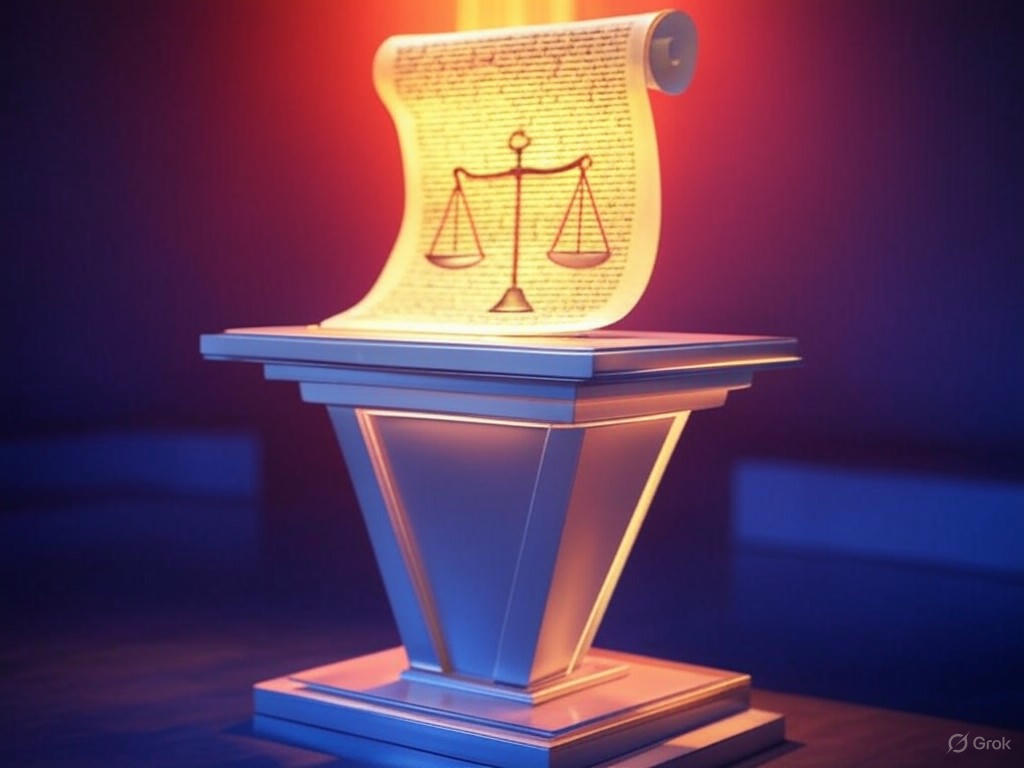
Trump’s Constitutional Defiance: Ignoring Rules in NBC Interview
Introduction
Former President Donald Trump has stirred fresh debate over Trump Constitution principles, especially after his evasive responses in a recent NBC interview on Meet the Press. When asked about upholding the Constitution, particularly the Fifth Amendment’s due process guarantees amid immigration policies, Trump replied with a simple “I don’t know,” raising alarms about presidential accountability. Have you ever wondered how such moments reveal deeper tensions in our democratic system?
The Controversial NBC Interview
This exchange highlighted potential Trump Constitution defiance, as Trump avoided directly affirming his duty to protect constitutional rights for all, including non-citizens. Instead, he shifted focus to Supreme Court decisions, sidestepping personal responsibility. It’s a moment that underscores the high stakes of leadership in a nation built on legal foundations.
Think about it: In an era of rapid policy changes, how does a leader’s reluctance to commit affect public trust? During the interview, Trump’s comments left many questioning whether Trump Constitution standards are being upheld or overlooked.
Key Points from the Interview
- Trump failed to confirm his obligation to the Fifth Amendment’s due process protections, a core element of Trump Constitution debates.
- He deferred questions to the Attorney General, hinting at a pattern of avoiding direct Trump Constitution accountability.
- His emphasis on judicial rulings over constitutional principles sparked widespread discussion about executive priorities.
For instance, imagine if every leader responded this way—could it erode the checks and balances we rely on? Legal experts often point to these instances as teachable moments for understanding Trump Constitution dynamics.
Understanding the Fifth Amendment and Due Process
The Fifth Amendment stands as a pillar of Trump Constitution protections, ensuring fair treatment and due process for everyone, from citizens to immigrants facing deportation. It guards against unjust government actions, demanding evidence and hearings before any major decisions. This isn’t just legal jargon; it’s a safeguard that keeps power in check.
- It mandates fair procedures to prevent arbitrary loss of life, liberty, or property.
- These rights apply broadly, challenging any attempts to bypass Trump Constitution norms in policy enforcement.
What if due process were ignored? It could lead to miscarriages of justice, something history warns us about through events like the internment of Japanese Americans during World War II.
Presidential Obligations and Historical Context
At the heart of Trump Constitution issues is the presidential oath to “preserve, protect, and defend” the Constitution, a promise that shapes every executive action. Historically, this has meant respecting legal precedents and maintaining administrative independence, even as the presidency has evolved. Trump’s interview adds a modern layer to this tradition, questioning how far leaders can bend without breaking these rules.
Over the years, presidents have navigated complex challenges, from civil rights to foreign policy, always with Trump Constitution principles in mind. For example, Abraham Lincoln’s suspension of habeas corpus during the Civil War was debated but ultimately tied back to constitutional necessity.
Evolution of the Presidency and Rule of Law
The presidency has grown in scope over the last century, influenced by court decisions and societal shifts, yet Trump Constitution fidelity remains essential. Today’s leaders must balance authority with restraint, ensuring their actions align with foundational values. This evolution invites us to ask: How do we adapt these principles for contemporary issues like immigration and national security?
| Presidential Duty | Constitutional Basis | Implications of Defiance |
|---|---|---|
| Uphold constitutional rights | Article II, Oath of Office | Weakens Trump Constitution integrity and public confidence |
| Ensure due process | Fifth Amendment | Threatens individual freedoms and democratic norms |
These duties aren’t abstract; they protect everyday people from overreach, much like how recent court rulings have challenged executive orders on immigration.
Wider Reactions and Legal Analysis
Trump Constitution defiance has drawn intense scrutiny from scholars and critics, who argue it signals a troubling disregard for core democratic tenets. Legal analysts emphasize that presidents must actively defend rights, not evade them, especially in high-profile settings like media interviews. This backlash reflects broader concerns about leadership in polarized times.
- Experts stress the non-negotiable nature of Trump Constitution obligations, warning of potential erosions in civil liberties.
- Advocates highlight how such stances could disproportionately affect vulnerable groups, like immigrants seeking asylum.
- Commentators note patterns in Trump’s rhetoric that echo past Trump Constitution controversies, fueling ongoing debates.
What’s your take—does this interview change how you view presidential transparency? For actionable insight, consider following legal updates from reliable sources to stay informed.
Media and Public Response
Outlets like NBC have amplified discussions on Trump Constitution matters, with analysts dissecting the implications for governance and accountability. Public reactions range from outrage to calls for reform, illustrating media’s role in shaping perceptions. This coverage isn’t just news; it’s a catalyst for civic engagement.
In similar past events, like Watergate, media scrutiny led to significant reforms, reminding us how Trump Constitution watchdogging keeps democracy alive.
Freedom of the Press and Accountability
Press freedom is crucial in countering potential Trump Constitution oversteps, allowing journalists to probe and expose inconsistencies. Tools like reporter’s privilege and shield laws empower them to hold leaders accountable without fear. In Trump’s case, this interview exemplifies why these protections matter—ensuring the public gets the full story.
- The First Amendment bolsters investigative journalism, vital for monitoring Trump Constitution compliance.
- State shield laws prevent source disclosures, fostering honest reporting on governmental actions.
If you’re passionate about this, why not explore how you can support press freedoms through advocacy or informed voting?
The Broader Implications for Democracy
Trump Constitution challenges extend beyond one interview, potentially weakening democratic institutions and public trust. When leaders question foundational norms, it risks normalizing exceptions that could harm marginalized communities. This is more than politics—it’s about preserving the essence of American governance.
For example, historical instances of constitutional tests, like the Civil Rights Movement, show how vigilance leads to progress. What steps can we take today to safeguard these principles?
Potential Consequences of Constitutional Defiance
- Risks heightening vulnerabilities for immigrants and other groups under Trump Constitution scrutiny.
- It may deepen divisions, making Trump Constitution adherence a partisan flashpoint rather than a shared value.
- Long-term, it could erode faith in government, prompting calls for reforms like stronger oversight mechanisms.
Here’s a tip: Stay engaged by discussing these issues with friends or joining community forums to foster informed dialogue.
Conclusion: Upholding Constitutional Integrity
In the end, Trump Constitution principles demand unwavering commitment from all leaders, and this NBC interview serves as a stark reminder of that duty. It’s up to us—citizens, media, and advocates—to push for transparency and accountability. By staying vigilant, we can help protect the democracy we cherish.
If this topic resonates, I’d love to hear your thoughts in the comments below. Share this post or check out related articles on our site for more insights—what’s one way you’ll engage with these issues today?
References
1. [Video Source]. “Meet the Press Interview.” NBC News. YouTube.
2. [Resource on Writing and Editing]. “Great Search Links.” Writers and Editors. Link.
3. [Personal Blog]. “All In.” Robby Slaughter. Link.
4. [Legal Paper]. “Executive Power and Administrative Norms.” Columbia Law Review. PDF Link.
5. [Journalism Resource]. “Journalism and Journalists.” Writers and Editors. Link.
6. [Scholarly Article]. “Coercive Interrogation.” eScholarship. PDF Link.
7. [Research Paper]. “Coercive Interrogation Strategies.” Paul N. Stockton. PDF Link.
8. [Book or Report]. “The Networked Leviathan.” Networked Leviathan. PDF Link.
Trump Constitution, NBC interview, presidential defiance, due process, constitutional duty, Fifth Amendment, executive obligations, democracy implications, media scrutiny, rule of law






